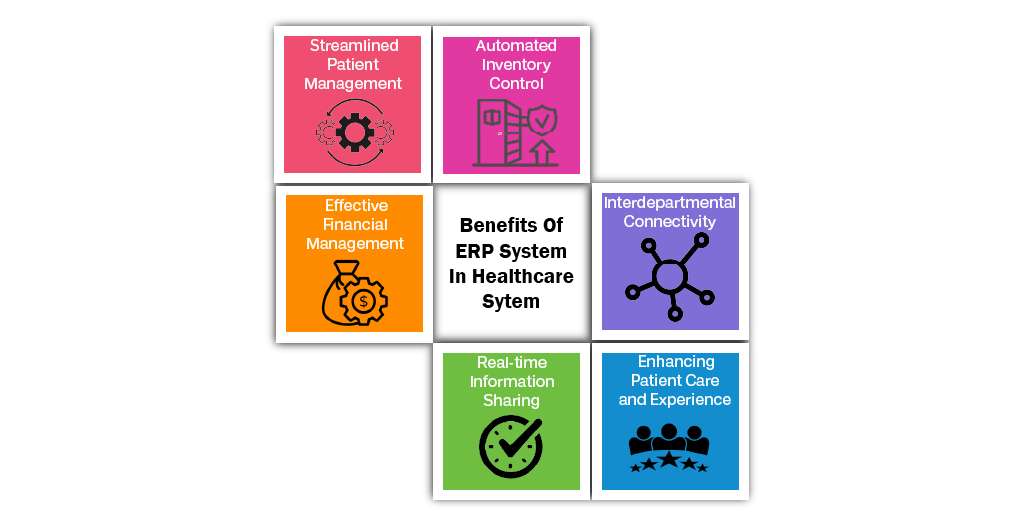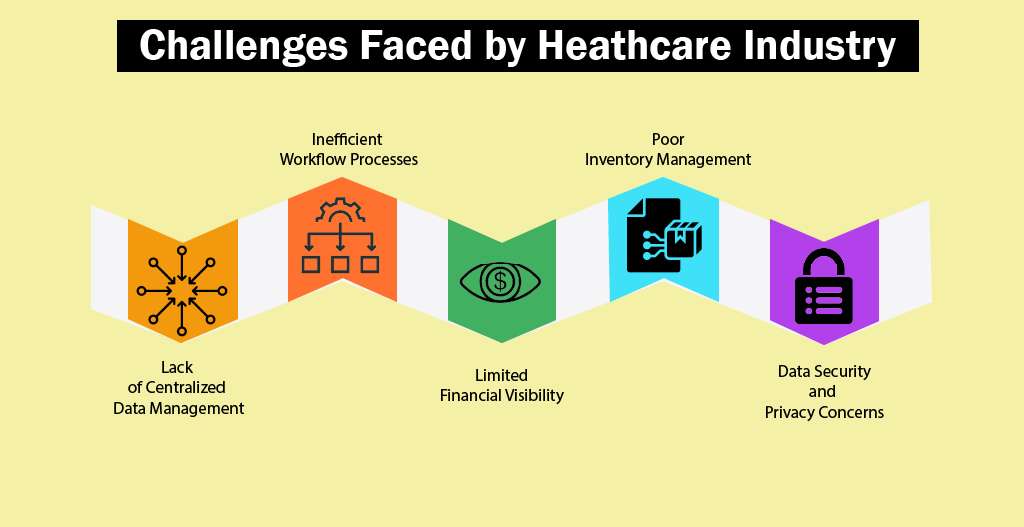
Table Of Content
This article explains the benefits of the ERP System and the challenges of Healthcare Management, focusing on its potential to improve healthcare administration.
Know about Healthcare Industry
The term “healthcare industry” refers to a broad sector that includes all institutions, businesses, and individuals engaged in giving people and communities access to medical care, treatments, or products. It covers medical facilities, clinics, pharmaceutical companies, medical device makers, insurers of healthcare, and research institutions.
The main objective of this industry is to enhance the quality of life, advance medical science and technology, and promote health. To provide patients with healthcare services, healthcare workers like physicians, nurses, and other allied health professionals are essential.
ERP for the Healthcare Industry: Streamlining Operations and Improving Patient Care
Today, ERP is employed in every industry. It is often a software suite or software-as-a-service(SaaS), that connects and centralizes data in all of a company’s systems, from accounting to procurement to project management to supply chain operations. ERP ensures that data flows smoothly across all of these interconnected platforms. It can help users organise and utilize data to make enterprise-wide choices by eliminating data duplication. A centralized ERP for the Healthcare Industry breaks down gaps in information, which improves accessibility and quality of patient care, streamlines processes, and lowers total costs. There is little doubt that the significant advantages delivered by ERP to other industries can be extended to the healthcare business.
Software Solutions for Enterprise Resource Planning (ERP) integrate multiple aspects of organisational operations, including finance, human resources, supply chain management, and customer relationship management. ERP systems play an important role in the healthcare industry, as they streamline operations, improve patient care, and enhance overall efficiency. These systems are designed to integrate various functions, including patient management, inventory control, billing, and scheduling.
By consolidating information and automating processes, ERP enables healthcare organizations to operate efficiently, make informed decisions, and improve overall performance. Designed ERP solutions specifically for the healthcare sector to provide real-time insights, ensure regulatory compliance, and facilitate seamless collaboration among stakeholders. With their professional capabilities, ERP systems are a valuable asset for healthcare professionals looking to optimize their operations and provide top-notch patient care.
ERP for healthcare: how does it work?
Healthcare information systems are complicated and interconnected, and in the past, they were frequently built from a patchwork of specialized subsystems that didn’t necessarily communicate well with one another. This unplanned approach increased complexity, reducing an organization’s ability to care for patients and increasing expenditures.
A good ERP solution unites all of the diverse parts of a complex healthcare organisation under a single roof. Each component is meant to work in tandem with the others, giving carers unrestricted access to all data across the organisation. Data can be shared across patient, pharmacy and clinician systems, as well as back-office administrative, personnel, and financial systems, allowing for better cost tracking and resource management.
Challenges Faced by the Healthcare Industry without ERP
The healthcare industry plays an important role in society by offering people access to crucial medical services. These industries face several challenges that affect the healthcare industry’s capability to deliver cost-effective and efficient care. These problems, which range from regulatory difficulties to technological improvements, can have a significant impact on how healthcare is delivered and patient outcomes.
These challenges are given below.
- -Lack of Centralized Data
- -Inefficient Workflow Processes
- -Limited Financial Visibility
- -Poor Inventory Management
- -Data Security and Privacy
- -Lack of Analytical Insights
- -Staff Burnout and Fatigue
- -Patient Dissatisfaction

Inefficient operations and fragmented information can lead to patient dissatisfaction. Delays in accessing medical records, miscommunication between ERP for the Healthcare Industry providers, and billing errors can erode patient trust and satisfaction.The healthcare sector can overcome these challenges and work toward providing people and communities with accessible, high-quality, and cost-effective care by prioritizing patient-centric care, implementing technology-driven solutions, advocating for policy changes, and encouraging collaboration among stakeholders. By understanding these challenges and developing effective strategies, stakeholders in the healthcare sector can work towards overcoming them.
Key Benefits of ERP Systems in the Healthcare Industry
The system selected by a hospital or physician network will be determined by a variety of variables, including integration with existing systems, hospital or network size, and whether mobile access is relevant. The following are the most essential features, according to the previously cited article:
- Errors in data entry and coding are eliminated
- Controlling the expanding and diverse supply chain processes
- Employee and patient management that is strong
- AI and predictive analytics for patient quality assurance
Modern ERP systems created for the healthcare sector provide a variety of benefits that aims at meeting the unique requirements of healthcare providers.
Patient management: ERP systems allow healthcare organizations to efficiently manage patient data, including medical history, appointments, and billing information.
Inventory control: With ERP, healthcare facilities can automate inventory management, ensuring adequate supplies of medications, medical equipment, and consumables.
Financial management: ERP systems provide robust financial modules that handle billing, invoicing, and accounting tasks, helping healthcare organizations maintain accurate financial records and streamline revenue cycles.
ERP Systems Enhance Operational Efficiency in Healthcare Industry
Centralize patient information, facilitating easy access and streamlined workflows. By integrating patient records, appointment scheduling, and billing processes, healthcare staff can efficiently manage patient care and ensure accurate documentation. This results in reduced administrative overhead, improved patient satisfaction, and enhanced overall operational efficiency.
Managing inventory in healthcare facilities is a critical task that directly impacts patient care. ERP systems automate inventory control processes, enabling real-time monitoring of stock levels, tracking expiration dates, and streamlining procurement. This helps healthcare organizations avoid stockouts, minimize waste, and ensure the availability of essential supplies when needed, ultimately improving patient safety and reducing costs.
Healthcare organizations face complex financial challenges, including insurance claims, billing discrepancies, and reimbursement processes. ERP systems equipped with robust financial management modules simplify these tasks by automating billing, claims processing, and financial reporting. By streamlining financial operations, healthcare providers can optimize revenue cycles, minimize errors, and enhance financial decision-making.
ERP System helps in improving Communication and Collaboration
Effective communication and collaboration among different departments are essential for seamless healthcare delivery. ERP systems enable interdepartmental connectivity by providing a centralized platform where healthcare staff can access and share patient information, test results, and treatment plans. This promotes coordination, reduces delays, and improves overall patient care.
In a hectic healthcare environment, convenient access to reliable information is essential for providing high-quality care. ERP systems integrate numerous systems and databases to enable real-time information sharing. This includes healthcare providers’ access to the latest patient data, medication histories, and treatment plans, enabling them to make well-informed decisions and offer specialized care.
Enhancing the experience and care of patients with an ERP system
The main objectives of healthcare providers are to offer outstanding patient care and the improvement of patient outcomes. ERP systems play a vital role in achieving this objective by streamlining operations, minimizing errors, and improving overall efficiency. With integrated patient data, healthcare professionals can make informed decisions, reduce duplication of tests, and provide personalized treatments. This ultimately enhances patient care, safety, and overall experience.
Ensuring Regulatory Compliance in Management with ERP
The healthcare industry is subject to numerous regulations and compliance requirements. ERP systems help healthcare organizations ensure adherence to these regulations by providing features such as audit trails, data security measures, and standardized processes. By automating compliance-related tasks and maintaining accurate records, ERP systems contribute to risk management and regulatory compliance, reducing the potential for penalties or legal issues.
Security and Data Privacy are enhanced by ERP systems
As healthcare industries digitize their processes, protecting data privacy and security becomes more critical than ever. ERP systems include strong security measures including access limits, encryption, and data backup techniques. Compliance with data protection laws, such as the Health Insurance Portability and Accountability Act (HIPAA), is important to protect patient records and maintain faith in the healthcare system.
What can Adsgrill do for your healthcare business with ERP solutions?
Adsgrill is a software development company providing the world’s best healthcare software development services to improve medical treatment. We are recognized for providing innovative healthcare application development solutions that facilitate fast-paced medical ecosystems. Adsgrill delivers patient-centered, data-driven IT Solution that delivers high-quality care to patients using our smart healthcare industry solutions. Our focus on the individual patient has led to innovations in healthcare technology that are driving higher-quality, cost-effective care.
- Adsgrill Resource Centre
Adsgrill deliver patient-centered, data-driven IT Solution that delivers high-quality care to patients using our smart healthcare industry solutions.

